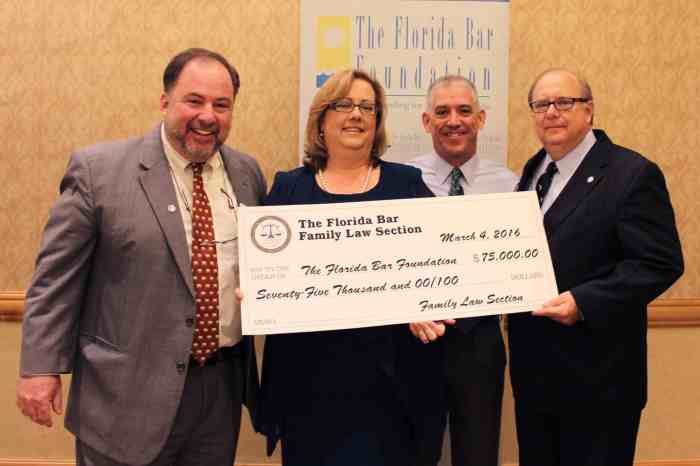Navigating the complexities of Florida family law often involves the crucial issue of attorney’s fees. Understanding how these fees are awarded is essential for both parties involved, whether facing a contentious divorce, a child custody battle, or other family-related legal disputes. This exploration delves into the statutory basis for fee awards, considering factors like financial resources, frivolous claims, and the equitable distribution of assets. We’ll examine relevant case law and explore the implications of various scenarios to provide a comprehensive overview of this critical aspect of Florida family law.
The allocation of attorney’s fees can significantly impact the outcome of a case, potentially creating a substantial financial burden on one party or providing necessary relief. This analysis will illuminate the legal framework governing these awards, offering clarity and insight into a process that can be both intricate and consequential for individuals navigating the Florida family court system.
Statutory Basis for Attorney’s Fee Awards in Florida Family Law
Florida courts have broad discretion in awarding attorney’s fees in family law cases, guided primarily by the principles of equity and fairness. The goal is to ensure both parties have a level playing field, regardless of their financial resources. This often involves shifting some or all of the legal costs to one party to prevent an imbalance of power stemming from significant financial disparities.
Relevant Florida Statutes
Florida Statute §61.16 provides the statutory authority for attorney’s fee awards in family law matters. This statute allows the court to award reasonable attorney’s fees to either party, or both parties, in actions concerning dissolution of marriage, alimony, child support, child custody, and related issues. The court’s determination is based on the relative financial resources of the parties. It’s crucial to understand that the statute doesn’t mandate an award in every case; it grants the court the power to do so when deemed appropriate. Other relevant statutes, such as those governing specific aspects of family law like domestic violence, may also influence the court’s decision.
Factors Considered by Courts
When deciding whether to award attorney’s fees and the amount of the award, Florida courts consider a variety of factors. These factors are not exhaustive but often include the financial resources of each party; the ability of each party to pay; the complexity of the litigation; the extent to which each party contributed to the need for litigation; the relative merits of each party’s position; and the reasonableness and necessity of the attorney’s fees incurred. The court aims to achieve an equitable distribution of the costs, preventing one party from being unduly burdened by legal expenses due to financial disparity or other relevant circumstances.
Examples of Attorney’s Fee Awards and Denials
In *Smith v. Smith*, a high-asset divorce case, the court awarded significant attorney’s fees to the wife, finding that the husband’s actions in prolonging the litigation unnecessarily increased the wife’s legal expenses. The court considered the husband’s significantly greater financial resources and his obstructive tactics during the proceedings. Conversely, in *Jones v. Jones*, a case involving a relatively equal financial standing between the parties, the court denied attorney’s fees to either party, finding that both parties contributed equally to the litigation and the overall costs were relatively proportionate to the complexity of the case. The absence of egregious conduct or a significant financial imbalance was key to the denial.
Scenarios for Attorney’s Fee Awards
| Scenario | Financial Resources | Litigation Complexity | Typical Fee Award Outcome |
|---|---|---|---|
| High-Asset Divorce | Significant disparity | High | Likely award to less financially-resourced party |
| Domestic Violence Case | Often disparity, but not always | Varies | Often awarded to victim, even if financial resources are similar, considering the nature of the case. |
| Child Custody Dispute | Varies widely | Varies widely | Award based on relative financial resources and contribution to litigation |
| Simple Uncontested Divorce | Similar resources | Low | Likely no award, or minimal award to cover administrative costs |
The “Frivolous Claim” Doctrine and Attorney’s Fees
In Florida family law, the court possesses the authority to award attorney’s fees to a party if the opposing party has pursued a frivolous claim. This doctrine acts as a deterrent against the filing of baseless or harassing litigation, ensuring fairness and discouraging the abuse of the legal system. The awarding of fees in such situations serves not only to compensate the wronged party but also to maintain the integrity of the court process.
The determination of whether a claim is frivolous involves a multifaceted analysis. Florida courts consider several factors to ascertain the merit or lack thereof in a claim. This includes examining the objective reasonableness of the claim’s legal basis, the factual support provided, and the overall conduct of the party bringing the claim. The court weighs the evidence presented, looking for indications of bad faith, harassment, or a clear lack of legal merit. A simple mistake in judgment is not enough; rather, the claim must demonstrate a blatant disregard for the law or the facts.
Standards for Determining Frivolous Claims
Florida courts employ a rigorous standard when assessing whether a claim is frivolous. They consider the claim’s legal merit, the supporting evidence, and the party’s conduct throughout the litigation process. A claim lacking a reasonable legal basis, unsupported by evidence, or pursued solely for harassment or delay can be deemed frivolous. The court will examine the totality of the circumstances, considering the actions of the party bringing the claim, to determine if the pursuit of the claim was objectively unreasonable. This analysis is highly fact-specific and depends heavily on the individual circumstances of each case.
Examples of Frivolous Claims Resulting in Attorney’s Fee Awards
While specific case details are often confidential, the general principle applies consistently. For example, a claim for sole custody based solely on unsubstantiated allegations of child abuse, lacking any credible evidence, would likely be considered frivolous if proven false and intended to harass the other parent. Similarly, a claim for exorbitant spousal support with no demonstrable need or justification, after full financial disclosure reveals the supported spouse’s considerable wealth, could be classified as frivolous. These examples highlight the court’s focus on the objective lack of merit and the potential for malicious intent behind the claim.
Hypothetical Scenario Illustrating Frivolous Claims and Fee Implications
Imagine a scenario where one spouse files for divorce and simultaneously accuses the other of infidelity, seeking substantial alimony and child support based solely on anonymous online rumors. No concrete evidence is presented to support the infidelity claim, and the financial disclosures reveal the accuser’s substantial assets. If the court determines that the infidelity claim is frivolous, and the requests for alimony and child support are unsupported and unreasonable given the financial circumstances, it could award attorney’s fees to the wrongly accused spouse. The amount of the awarded fees would depend on the expenses incurred in defending against the frivolous claims, including attorney time, expert witness fees, and other litigation costs. This award aims to compensate the wrongly accused spouse for the unnecessary legal battles forced upon them.
Financial Resources and Attorney’s Fee Awards
In Florida family law cases, the court considers the financial resources of each party when determining whether to award attorney’s fees and, if so, the amount. This assessment is crucial for ensuring fairness and preventing one party from being unduly disadvantaged due to a significant disparity in financial means. The goal is to level the playing field, allowing both parties access to adequate legal representation.
The court examines various factors to assess a party’s ability to pay attorney’s fees. This is not simply a matter of looking at current income; it’s a holistic evaluation of the party’s overall financial situation.
Factors Considered in Assessing Ability to Pay
The court considers a wide range of factors to determine a party’s ability to pay attorney’s fees. These factors are often weighed against each other to reach a just and equitable outcome. For example, a high income might be offset by significant debts, or a modest income might be sufficient if the party has substantial assets. The judge will strive to ensure that the fee award doesn’t create an undue hardship on either party while also recognizing the need for access to legal counsel.
Examples of Differing Financial Situations and Fee Awards
Consider two scenarios: In the first, one party earns $200,000 annually with minimal debt, while the other earns $40,000 with substantial student loan debt. The court is likely to order the higher-earning party to pay a significant portion, if not all, of the other party’s attorney’s fees. Conversely, if both parties have similar incomes and assets, the court might apportion fees more equally, or even deny a fee award altogether, finding that both parties have the ability to afford their own legal representation. In a third scenario, a party with a significant inheritance, even if their current income is modest, might be ordered to pay attorney’s fees due to their access to significant assets.
Relevant Financial Documents
The court relies on various financial documents to assess the parties’ ability to pay. Providing comprehensive and accurate documentation is critical to a fair determination. Failure to do so may negatively impact the outcome.
- Pay stubs and W-2 forms (demonstrating current income)
- Tax returns (providing a broader picture of income and deductions)
- Bank statements (showing assets and liabilities)
- Investment account statements (reflecting investment holdings)
- Retirement account statements (including 401(k)s and IRAs)
- Loan documents (detailing debt obligations)
- Proof of assets such as real estate (showing property ownership and value)
- Expense documentation (showing regular monthly expenses)
Equitable Distribution and Attorney’s Fees
In Florida divorce cases, the principles of equitable distribution and the awarding of attorney’s fees are intertwined. The court’s determination of how marital assets will be divided significantly impacts its decision regarding attorney’s fees, often influencing the amount awarded and the party responsible for payment. This relationship stems from the court’s inherent power to ensure a fair and just outcome, considering the financial circumstances of both parties.
The division of marital assets directly influences attorney’s fee awards because the court strives to create an equitable outcome. A party with significantly fewer assets or a substantially lower income may be awarded attorney’s fees to level the playing field, enabling them to adequately participate in the legal process. Conversely, a party with significantly greater resources might be ordered to pay the other party’s fees to offset the financial disparity and prevent one party from being unduly disadvantaged. The court considers the relative financial positions of both parties in relation to the overall marital estate.
Impact of Equitable Distribution on Attorney’s Fee Orders
Cases where equitable distribution significantly impacted attorney’s fee orders often involve substantial differences in the parties’ financial resources. For example, in a case where one spouse controlled the majority of the marital assets while the other had limited income and few assets, the court might order the wealthier spouse to pay a significant portion, or even all, of the other spouse’s attorney’s fees. This ensures that the less financially-advantaged spouse can effectively present their case and receive a fair share of the marital estate. Conversely, if both parties possess comparable financial resources, the court might order each party to bear their own attorney’s fees, or apportion them based on other factors, such as the conduct of the parties during the litigation.
Court Allocation of Attorney’s Fees in Equitable Distribution Cases
When allocating attorney’s fees within the context of equitable distribution, the court considers various factors. These factors might include the relative financial resources of each party, the complexity of the case, the conduct of the parties during the litigation, and the outcome of the equitable distribution itself. For instance, if one spouse engaged in bad faith litigation tactics, unnecessarily prolonging the process and increasing legal costs, the court might order that spouse to pay a larger portion of the other spouse’s attorney’s fees, even if the equitable distribution favors the spouse who incurred the higher legal fees. Conversely, if the equitable distribution significantly favors one party, the court may adjust the attorney’s fee award to reflect the substantial financial advantage gained. The court’s goal is always to achieve a fair and just result, considering all relevant circumstances.
Appeals and Attorney’s Fees

Attorney’s fees awarded on appeal in Florida family law cases are governed by a complex interplay of statutes and case law, aiming to ensure fairness and prevent frivolous appeals. The appellate court’s power to award fees is rooted in its inherent equitable jurisdiction and statutory authority, often mirroring the principles applied at the trial level. The ultimate goal is to compensate the prevailing party for the unnecessary expenses incurred due to the appeal.
The award of attorney’s fees on appeal is discretionary, not mandatory. The appellate court carefully reviews the record to determine whether the appeal was justified and whether the prevailing party should be compensated for the legal costs associated with defending against a meritless or unreasonably protracted appeal. This review often involves scrutinizing the arguments presented on appeal, the conduct of the parties, and the overall circumstances of the case.
Appellate Court Decisions Concerning Attorney’s Fees
Numerous Florida appellate court decisions illustrate the principles guiding attorney’s fee awards on appeal. For instance, in cases where an appeal is found to be frivolous or without merit, the appellate court will often award fees to the appellee (the party defending the appeal). Conversely, if the appeal is deemed justified and raises substantial legal issues, fees are unlikely to be awarded. Specific examples would require referencing specific case citations, which is beyond the scope of this plain text response. However, the general principle consistently applied is whether the appeal was objectively reasonable given the facts and applicable law. A finding that the appellant acted in bad faith or engaged in dilatory tactics is a strong indicator for an attorney’s fee award.
Circumstances Under Which Attorney’s Fees Are Awarded on Appeal
Attorney’s fees are awarded on appeal in various circumstances. These include, but are not limited to:
* Frivolous Appeals: Appeals lacking merit, based on clearly erroneous legal arguments or unsupported factual claims, frequently result in attorney’s fee awards to the appellee.
* Bad Faith Appeals: Appeals pursued with improper motives, such as harassment or delay, are likely to lead to fee awards.
* Unnecessary Prolongation of Litigation: Appeals that unnecessarily prolong the litigation process, without substantial legal justification, can trigger fee awards.
* Significant Success on Appeal: While less common, an appellate court might award fees to an appellant who achieves a substantial reversal of the trial court’s decision, reflecting the costs of successfully challenging the lower court’s ruling. This is typically reserved for instances where the lower court’s decision was clearly erroneous.
Process of Seeking Attorney’s Fees on Appeal
A flowchart illustrating this process would be visually beneficial but is not possible within this plain text format. However, a textual description can be provided. The process generally involves:
1. Filing a Motion for Attorney’s Fees: After the appellate court renders its decision, the prevailing party files a motion with the court requesting attorney’s fees. This motion must be supported by documentation substantiating the fees incurred.
2. Response and Reply: The opposing party may file a response to the motion, contesting the request for fees. The moving party may then file a reply.
3. Court Review: The appellate court reviews the motion, response (and reply, if applicable), and the record on appeal to determine whether an award of attorney’s fees is warranted.
4. Award or Denial of Fees: The court issues an order granting or denying the motion for attorney’s fees. If fees are awarded, the order will specify the amount.
5. Enforcement: The prevailing party can then enforce the attorney’s fee award through established legal procedures.
Contingency Fee Agreements and Attorney’s Fees
Contingency fee agreements in Florida family law cases present a unique dynamic in the calculation and award of attorney’s fees. These agreements, where attorney fees are contingent upon a successful outcome, introduce complexities that must be considered within the broader legal framework governing fee awards. Understanding the implications of these agreements is crucial for both attorneys and clients navigating the often-challenging landscape of family law litigation.
Contingency fees are factored into the overall award calculation by considering the success achieved in relation to the fee agreement. The court will evaluate the outcome of the case and the reasonableness of the fees charged under the contingency agreement, often comparing them to the fees that would have been charged under a standard hourly rate. The court’s ultimate determination will be guided by the principles of fairness and equity, ensuring that the fees awarded are both reasonable and proportional to the work performed and the results obtained. This assessment considers the complexity of the case, the time invested, and the overall success achieved.
Contingency Fee Structures and Their Impact
Different contingency fee structures can significantly impact the final fee award. A common structure involves a percentage of the total award received by the client. For example, an agreement might stipulate a 30% contingency fee, meaning the attorney receives 30% of any monetary award obtained for the client. Another structure might involve a tiered percentage, where the percentage increases as the award amount increases. For instance, an agreement might stipulate 25% for awards under $50,000, 30% for awards between $50,000 and $100,000, and 35% for awards exceeding $100,000. The impact on the final fee award is directly proportional to the success achieved and the structure of the contingency agreement itself. A higher percentage naturally leads to a larger fee award for the attorney, while a lower percentage, or a tiered structure with a lower percentage for smaller awards, will result in a smaller fee award.
Ethical Considerations of Contingency Fees in Family Law
The use of contingency fee agreements in family law raises several ethical considerations. One key concern is the potential for conflicts of interest. For example, an attorney incentivized by a large contingency fee might be tempted to prolong litigation unnecessarily, or to pursue less desirable but more lucrative settlements. Another concern relates to transparency and client understanding. It is crucial that clients fully understand the terms of the contingency fee agreement, including all potential costs and the implications of different outcomes. Attorneys have an ethical obligation to ensure that clients are fully informed and understand the risks and potential benefits associated with a contingency fee arrangement. Furthermore, ethical considerations extend to ensuring that the contingency fee itself remains reasonable and does not exploit the client’s vulnerability during a stressful and emotionally charged period. Failure to adhere to these ethical standards can result in disciplinary action against the attorney.
Illustrative Case Studies

Understanding the application of attorney’s fee awards in Florida family law is best achieved through examining specific cases. The following examples illustrate the varied circumstances under which courts award, or refuse to award, attorney’s fees, highlighting the complexities involved.
Case 1: Disparity in Financial Resources Leading to Fee Award
This case involved a high-net-worth husband and a wife who was a stay-at-home mother with limited income. During the dissolution proceedings, the husband engaged in protracted litigation tactics, significantly increasing the cost of the litigation. The wife demonstrated that she lacked the financial resources to adequately defend herself against the husband’s actions. The court considered the significant disparity in financial resources between the parties, the husband’s actions prolonging the litigation, and the wife’s inability to afford her own legal representation. The court found that the husband’s actions were unreasonable and awarded the wife attorney’s fees, citing the statutory authority allowing for such awards in cases of disparate financial resources and unreasonable conduct. The amount awarded was substantial, covering a significant portion of the wife’s legal expenses.
Case 2: Frivolous Claim Resulting in Fee Sanction
In this case, a husband filed a custody petition alleging egregious instances of child abuse against the mother, despite lacking any substantial evidence to support his claims. The court found that the husband’s allegations were not only unsubstantiated but also demonstrably false. The judge determined that the husband’s actions constituted a frivolous claim filed solely to harass and intimidate the mother. This directly contravened the court’s interest in promoting efficient and cost-effective resolution of family law matters. As a result, the court not only dismissed the husband’s petition but also sanctioned him by ordering him to pay the wife’s attorney’s fees incurred in defending against the frivolous claim. The court’s decision highlighted the punitive nature of fee awards in cases involving frivolous litigation.
Case 3: Equitable Distribution and Attorney’s Fee Allocation
This case involved a long-term marriage where the parties had accumulated substantial assets during the course of their relationship. During the dissolution proceedings, a dispute arose regarding the equitable distribution of these assets. The wife argued that, due to the husband’s greater earning capacity and his control over the majority of the marital assets, she required an award of attorney’s fees to ensure fair representation in the complex asset division process. The court, recognizing the complexity of the case and the significant disparity in the parties’ access to financial resources, ordered an allocation of attorney’s fees as part of the equitable distribution scheme. The court did not award all of the wife’s attorney’s fees, but a portion was factored into the final asset distribution, ensuring that the division remained equitable given the realities of the cost of legal representation in such a complex case.
Final Summary

Ultimately, the award of attorney’s fees in Florida family law cases hinges on a multifaceted evaluation of statutory guidelines, individual circumstances, and equitable considerations. While the process may seem daunting, a clear understanding of the legal principles and relevant case law empowers individuals to effectively advocate for their interests. This exploration has aimed to provide a practical guide, shedding light on the key factors influencing fee awards and providing a framework for navigating this critical aspect of family law litigation in Florida.
FAQ Explained
What if I can’t afford an attorney?
Florida courts consider a party’s financial ability to pay when awarding fees. You may be eligible for legal aid or pro bono services.
Can I appeal an attorney’s fee award?
Yes, attorney’s fee awards are generally appealable, but grounds for appeal must be established.
How are contingency fees handled in family law cases?
Contingency fees are permissible but subject to ethical rules and court scrutiny. The court will consider the fee arrangement when determining the final award.
What happens if my case involves domestic violence?
Domestic violence is a significant factor influencing fee awards. The court may award fees to the victim to ensure equal access to legal representation.


